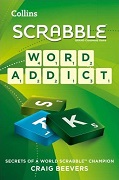Word Addict - A Review
As someone who started playing Scrabble at a very young age in Australia, the choice of Scrabble books was fairly limited: pretty much being Gyles Brandreth and Derryn Hinch. Since those days (a little over 30 years ago), the "Scrabble book" has evolved dramatically: think Word Freak, Letterati and the Scrabble Players Handbook.
Added to that list around a fortnight ago is Word Addict, by the 2014 World Champion, Craig Beevers.
 Craig became World Champion at the 2014 Scrabble Champions Trophy: personally, this was one of the best tournaments I have ever spectated (always having to watch them from afar). Live games, online coverage and more players exploring social media really engaged me as a viewer and it gave me the sense I was 10000 miles away in London than staying up nights in Melbourne.
Craig became World Champion at the 2014 Scrabble Champions Trophy: personally, this was one of the best tournaments I have ever spectated (always having to watch them from afar). Live games, online coverage and more players exploring social media really engaged me as a viewer and it gave me the sense I was 10000 miles away in London than staying up nights in Melbourne.
As a result, I was most eager to read this book.
I was not disappointed.
The book itself is divided into sections: a personal history leading up to the 2014 SCT, followed by a discussion of strategies and how they apply, which are then applied in two real life examples. The last section goes through 2 and 3 letter words and what resources are available for the player to develop their own play, regardless of level they are currently at.
Firstly, the writing style in the book is very personalised and that brings with it a very human aspect to what you are reading. All too often, there are examples where Scrabble is made out to be dry, mathematical and very much a niche mind sport. That is definitely not the case here!
By detailing his experiences of first interactions with clubs and tournaments culminating in the 2014 SCT in such a personalised style, it has the effect of making what you are reading very accessible. Moreover, it is overwhelmingly positive in its portrayal of competitive play - combine the two and it becomes very readable (which is a huge plus!).
This same style continues into the strategy section of the book. This aspect of Scrabble always runs the risk you will lose the reader by making it dry and technical. It is a triumph that this is definitely NOT the case here. Strategic play is explained simply and draws upon modern examples to illustrate the point (eg an online consensus game played out in the forums of a Facebook league).
The games played through are recent, actual and draw upon what has been written before, providing an appropriate culmination on what the reader has experienced so far.
Just as the 2014 SCT that Craig won was a prominent example of Scrabble coming into the digital age, so is this book.
By combining established Scrabble concepts, modern examples and a highly personalised and overwhelmingly honest writing style, the reader cannot help to be engaged in this book. Word Addict as a result, has the ability to reach a new generation of player: someone who loves playing Scrabble but has not set foot in face to face competitive environments.
I cannot recommend this unputdownable book highly enough.
Nick Ivanovski